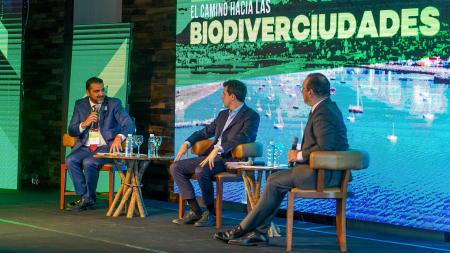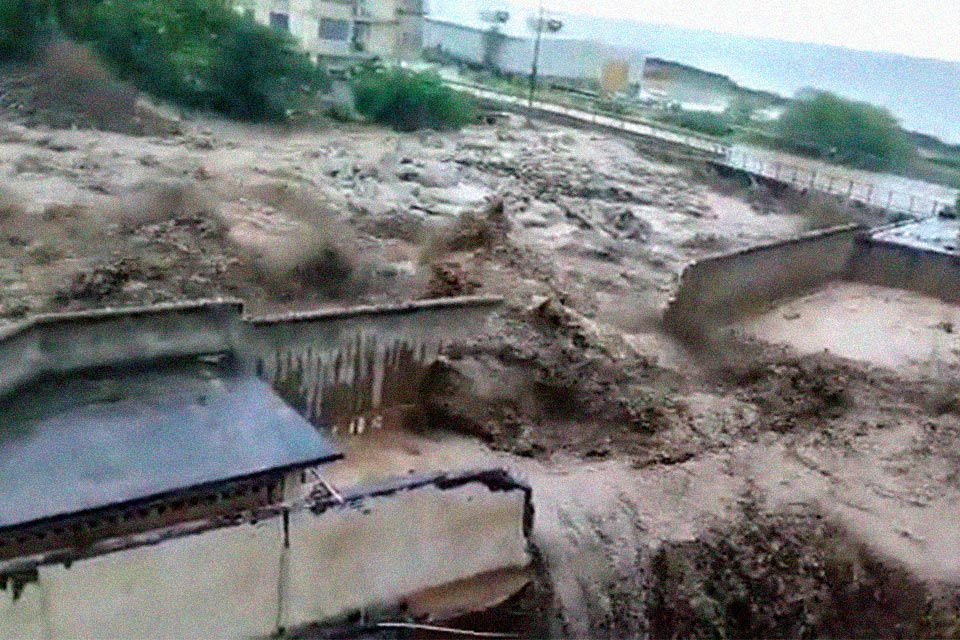De Pedro and Cabandié participated in the meeting of “BiodiverCities of Latin America and the Caribbean”
WATCH VIDEO
The interior ministers, Eduardo “Wado” de Pedro; and Environment and Sustainable Development, Juan Cabandie; They participated this Monday, in the city of Ushuaia, in the meeting of the network “BiodiverCities of Latin America and the Caribbean” organized by the Development Bank of Latin America (CAF) with the support of the Humboldt Institute.
The executive president of CAF, Sergio Diaz Granadosremarked that the initiative is about to celebrate one year and emerged in Colombia shortly after assuming his management at the entity.
“We met shortly after assuming the CAF board to see how we strengthened the Bank and how the entity assumed a more preponderant participation in the fulfillment of the sustainable development objectives by 2030, a role of peace and measures against change climate. The position with the greatest consensus was that we should work closer to local governments”, said Díaz Granados at the opening of the meeting, held in a hotel in Ushuaia.
He added that “we have built this network patiently and with a purpose: we think it will allow us to achieve the results we seek more quickly.”
“As a planet we are paying for the excesses of the last 70 years and today there is no city in Latin America that has not recently suffered from drought or floods,” observed the head of CAF.
In turn, he referred to the need to generate public policies “anchored in the relationship with nature and in the knowledge relationship between mayors” because “many problems are similar and many solutions share principles and values that can be transmitted from one place to another,” he said.
Meanwhile, De Pedro emphasized that “our region is the one that has polluted the least throughout history, while the countries that manage the main international banks and have greater decision-making power in multilateral organizations are the ones that contributed more than 55% of carbon dioxide and other polluting agents to a planet that also exhibits the consequences in the place where we live”.
De Pedro thought that the world needs a “bottom up” transformation since “upstairs the needs of our cities do not reach. And our needs are much more basic. For example, that it rains, that there is water and that there are no more fires, ”he listed.
The head of the Interior recalled that the most restrictive period of the pandemic helped the Argentine government to “rethink a population strategy”, and for this reason a federal plan was started to help the provinces retain their population and attract those who already They have gone to live in other places.
“We need productive ecosystems to function in harmony with the environment, so that work and development can be done in each town without the need to migrate to large urban centers,” he claimed.
In any case, he insisted that “we must convince” “the multinationals and multilateral organizations” that “we need to develop without destroying our forests and without polluting our rivers. We want to cancel our debts, but not at the cost of turning on a productive model that takes care of the environment, ”he warned.

The minister also spoke of an “environmental revolution of grandchildren and children. A much-needed cultural change and a clear message: take care of the world that you are going to leave us. And we are responsible for leaving a world a little better than the one we received”.
Meanwhile, Cabandié expressed: “You have to hold meetings like these, with local governments that have to make decisions, they are the first window for the citizens, the peoples. They are the first to solve”.
“This synergy that is being built between mayors, prefects, prefects, mayors and mayors is very good, because many times they manage to hold discussions and mobilize resources, of those that are scarce, as countries perhaps do not,” he added.
“Local management is extremely important within the environmental agenda, but we cannot analyze it separated from climate geopolitics”abounded
Cabandié continued that what “must be discussed on the table” is that “the emissions from Latin America and the Caribbean are not the same as those from the northern hemisphere.”
Regarding greenhouse gas emissions, he assured: “Those responsible are those who decide where to produce, how to produce, where the energy is going to be used and how it is going to be distributed.”
He also stressed that regions such as the peat bogs, the Amazon or the Chaqueño Park “have to be compensated by those who destroyed everything, which are those of the northern hemisphere.”
The head of Environmental, in turn, highlighted: “We want to coordinate with all the countries to say that, beyond mitigation, we want to increase the agenda that finances the adaptation to carry out the works, so that people live better”, and urged to “discuss social asymmetries”.
“When we talk about sustainable transition we also talk about just transition and that is territorial equity, common but differentiated responsibilities.”
Regarding production, he reiterated that “the environmental agenda is not anti-productivist”, although it should not be produced “as in the 20th century”.

For his part, the mayor of Ushuaia and host of the meeting, Walter Vuoto, thanked CAF for “ceasing to be a bank that only thinks about financing and that is dedicated to promoting the sustainable development of our cities, with a view to planned construction and balance with the environment”.
The Fuegian mayor referred to the need to “rethink the roles of local government in a world where climate change is a permanent challenge.”
“The idea is that we can continue to grow, finding points of agreement, planning strategically and exchanging management experiences,” Vuoto remarked.
The organization of the “BiodiverCiudades” meeting revealed that currently, 8 out of 10 Latin Americans live in cities and that, however, “excessive growth and disorderly urban sprawl have a negative impact on the relationship with the environment.”
“Cities are the heart of the global economy, but they have also become one of the main causes of climate change, putting the way of life of millions of people at risk and causing a sharp decline in biodiversity,” they diagnosed from the regional cities forum, born last year in Barranquilla, Colombia.
During his visit to Ushuaia, Pedro’s minister also participated together with Governor Gustavo Melella, Mayor Vuoto and the Secretary of Knowledge Economy, Ariel Sujarchuk, in the “First Patagonian Meeting for the Federal Development of the Knowledge Economy and the Knowledge Industry Software”.
The meeting brought together national actors, provincial governments and the private sector with the aim of “deepening the collaborative channels that allow tools to be provided to a sector with enormous potential in terms of value generation and local employment, taking into account regional equity as a fundamental factor. explained the organizers.
In turn, Cabandié also signed an agreement for USD 130,000 with CAF for a project linked to drylands in the NOA, “improving access to water and the application of sustainable land management practices.”
He also signed an agreement with the mayor Vuoto for the execution of a remediation initiative of the Cañadón de Las No Me Olvides; and a third with the municipality of San Martín, in the province of San Juan, for the execution of the “Boca del Tigre: Sustainable Rural Community” project, with funding provided by Environment for 36,729,879.70 pesos.
















